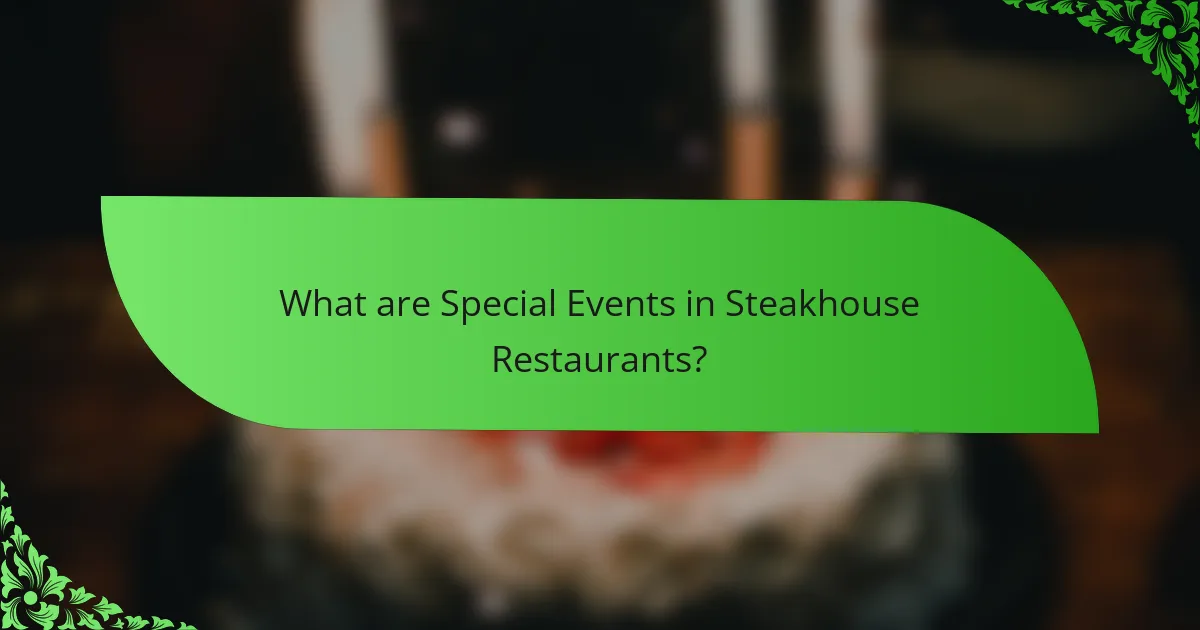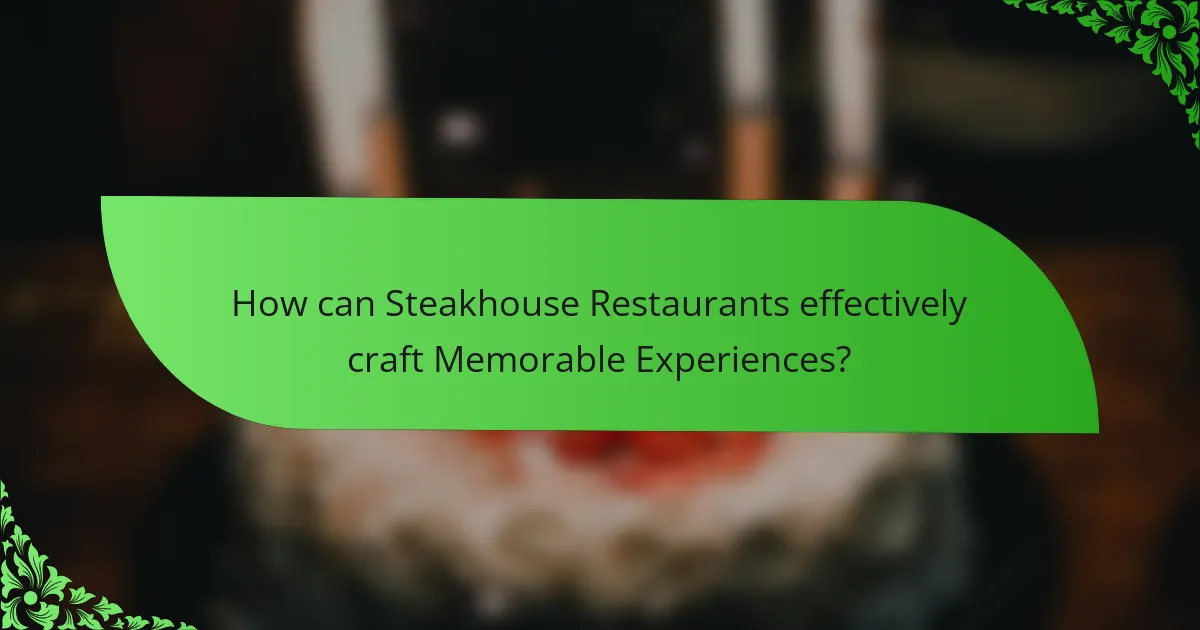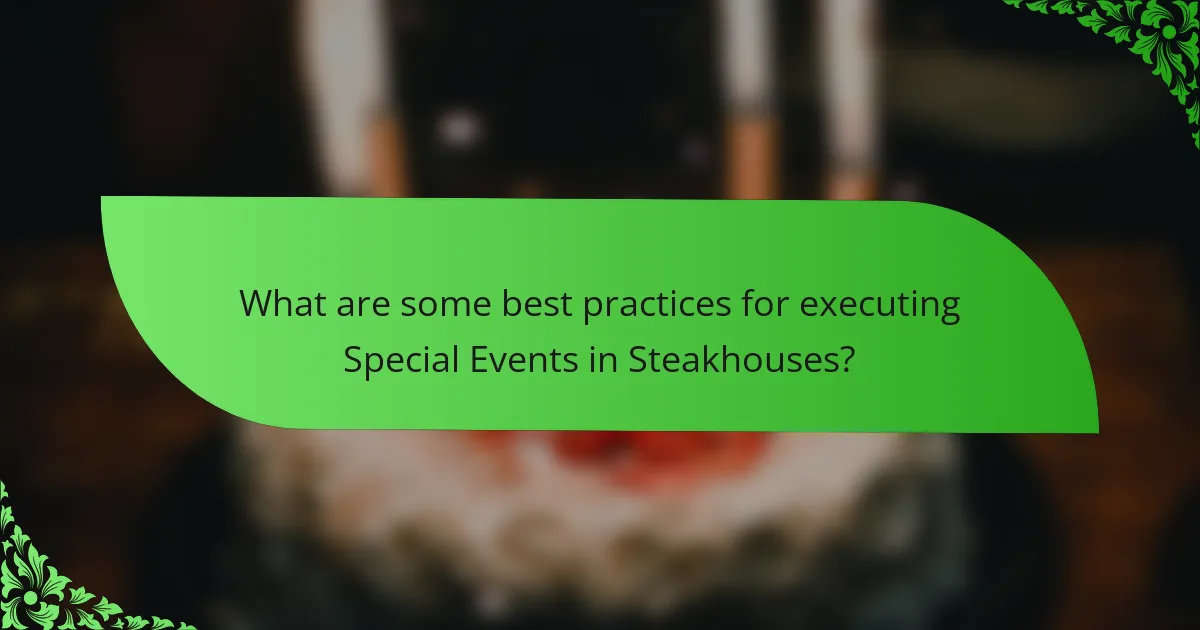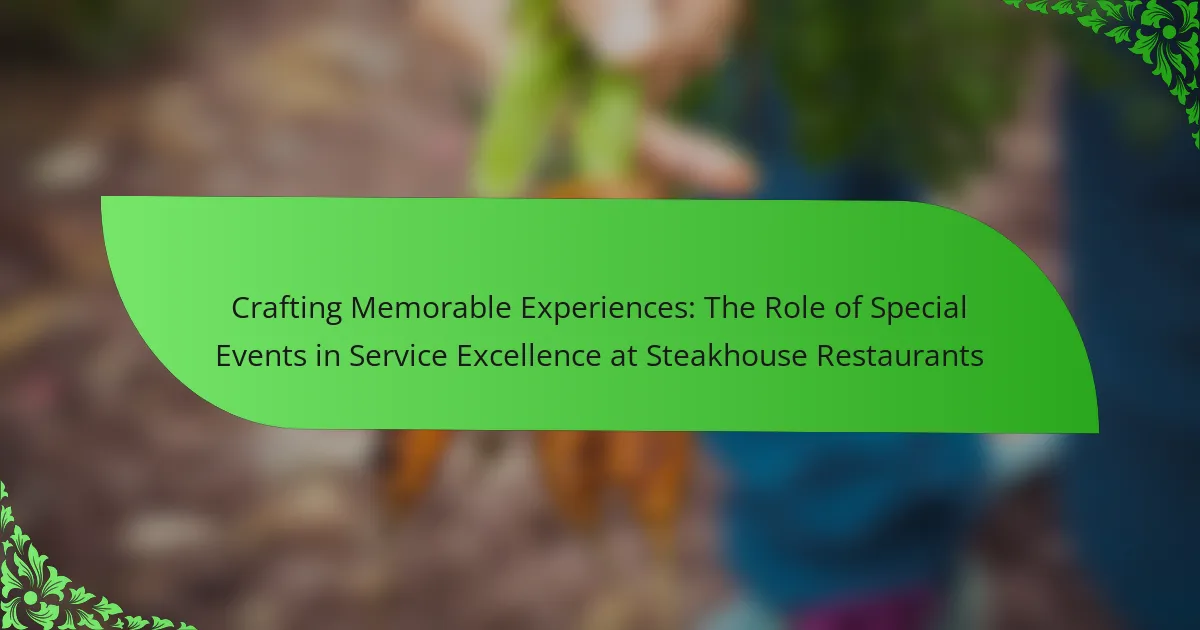Special events in steakhouse restaurants are gatherings that enhance the dining experience through unique offerings such as wine tastings, holiday celebrations, and themed dinners. These events often feature exclusive menus and promotions aimed at attracting new customers and fostering loyalty among existing patrons. By focusing on personalized service, high-quality ingredients, and a festive atmosphere, steakhouses can create memorable experiences that encourage social interaction. Best practices for executing these events include meticulous planning, collaboration with chefs for specialized menus, targeted marketing, and staff training to ensure exceptional service. Feedback collection after events further aids in refining future offerings, ultimately driving customer engagement and satisfaction.

What are Special Events in Steakhouse Restaurants?
Special events in steakhouse restaurants are unique gatherings designed to enhance the dining experience. These events may include wine tastings, holiday celebrations, or themed dinners. They often feature exclusive menus or special promotions. Special events aim to attract new customers and retain existing ones. They create a festive atmosphere that encourages social interaction. Many steakhouses use these events to showcase culinary skills and premium cuts of meat. For example, a wine pairing dinner might highlight specific steak types with complementary wines. Overall, special events serve as a strategic tool for boosting customer engagement and loyalty.
How do Special Events enhance the dining experience?
Special events enhance the dining experience by creating unique and memorable atmospheres. They often feature themed menus that showcase seasonal ingredients. This allows guests to enjoy exclusive dishes not typically available. Special events also include live entertainment, which adds an engaging element to the dining experience. For example, wine pairing dinners can educate guests about different wines and enhance their meal. Additionally, these events foster community and connection among diners. Research shows that restaurants hosting special events see increased customer satisfaction and loyalty. Overall, special events transform ordinary dining into extraordinary experiences.
What types of Special Events are commonly held at steakhouses?
Steakhouses commonly hold a variety of special events. These include wine tastings, which showcase different wine pairings with steak dishes. Holiday celebrations, such as Valentine’s Day and Father’s Day, attract families and couples. Corporate events, including business dinners and client meetings, are frequently hosted in private dining spaces. Additionally, steakhouses may organize themed nights, such as steak and seafood pairings or barbecue nights. Cooking classes and chef’s table experiences offer guests an interactive culinary experience. Live music events also enhance the dining atmosphere on special occasions. Each of these events aims to create memorable dining experiences for patrons.
How do Special Events differ from regular dining experiences?
Special events differ from regular dining experiences by offering unique themes and curated menus. These events often include special occasions like anniversaries or holiday celebrations. They typically provide exclusive access to limited-time dishes or beverages. Special events also feature enhanced service levels, often with dedicated staff. The atmosphere is usually more festive and designed for a memorable experience. Additionally, special events may include entertainment or interactive elements not found in regular dining. This combination creates a distinct experience that elevates the dining occasion beyond the everyday meal.
Why are Special Events important for Service Excellence?
Special events are crucial for service excellence as they enhance customer engagement and satisfaction. These events create unique experiences that differentiate a restaurant from its competitors. They foster a sense of community and belonging among patrons, encouraging repeat visits. Special events can also showcase a restaurant’s culinary offerings, attracting new customers. Data indicates that restaurants hosting events see a significant increase in customer footfall and revenue. For example, a study by the National Restaurant Association found that 70% of consumers are more likely to visit a restaurant that hosts special events. Therefore, special events play a vital role in elevating service quality and customer loyalty.
What role do Special Events play in customer satisfaction?
Special events significantly enhance customer satisfaction by creating unique experiences. These events foster a sense of community among patrons. They also provide opportunities for customers to engage with the brand in memorable ways. Special events can lead to increased customer loyalty. A study by the Event Marketing Institute found that 84% of consumers value experiences over products. This indicates that engaging events can positively impact customer perceptions. Additionally, well-executed events can generate positive word-of-mouth referrals. This further amplifies customer satisfaction and brand visibility in competitive markets.
How can Special Events contribute to brand loyalty?
Special events can significantly enhance brand loyalty by creating memorable experiences for customers. These events foster emotional connections between the brand and its audience. Engaging customers through unique experiences encourages repeat visits. For instance, themed nights or exclusive tastings can attract loyal patrons. Research indicates that 70% of consumers feel more connected to brands that host special events. This connection often translates into increased customer retention and advocacy. By providing exclusive access or personalized interactions during these events, brands can deepen customer relationships. Ultimately, special events serve as a powerful tool to reinforce brand loyalty in the competitive restaurant industry.

How can Steakhouse Restaurants effectively craft Memorable Experiences?
Steakhouse restaurants can effectively craft memorable experiences by focusing on personalized service, quality food, and unique events. Personalized service enhances customer satisfaction. Staff training in customer engagement boosts interactions. High-quality ingredients ensure exceptional meals. Unique events like wine tastings or themed dinners attract diverse clientele. Creating an inviting atmosphere adds to the dining experience. Regularly updating the menu keeps offerings fresh and exciting. Positive online reviews confirm the effectiveness of these strategies. According to a study by the National Restaurant Association, 70% of diners return for memorable service experiences.
What strategies can be implemented for successful Special Events?
Successful special events can be achieved through careful planning and execution. First, establish clear objectives for the event. This allows for focused efforts and measurable outcomes. Next, create a detailed budget to manage expenses effectively. Allocate funds for venue, catering, and entertainment. Third, select an appropriate venue that aligns with the event’s theme and expected attendance. A well-chosen location enhances the overall experience.
Additionally, develop a comprehensive marketing strategy to promote the event. Utilize social media, email campaigns, and local advertising to reach the target audience. Ensure that the event schedule is well-organized and includes engaging activities. This keeps attendees interested and involved throughout the event.
Furthermore, prioritize customer service by training staff to provide exceptional service. Well-trained staff can enhance attendee satisfaction and create a positive atmosphere. Finally, gather feedback post-event to assess success and identify areas for improvement. This data informs future events and helps refine strategies for success.
How does staff training impact the success of Special Events?
Staff training significantly enhances the success of special events. Trained staff demonstrate improved communication skills and customer service. This leads to higher guest satisfaction during events. Effective training also equips employees with problem-solving abilities. They can address issues quickly and efficiently. Additionally, trained staff can execute event logistics seamlessly. This minimizes disruptions and maintains a positive atmosphere. Research shows that well-trained employees can increase event attendance by up to 20%. Overall, staff training is crucial for delivering memorable experiences at special events.
What elements should be considered when planning a Special Event?
Key elements to consider when planning a special event include the venue, guest list, theme, budget, and timeline. The venue should accommodate the expected number of guests and fit the event’s theme. A well-defined guest list ensures that invitations are sent to the right individuals. The theme should align with the purpose of the event to create a cohesive experience. A clear budget helps in managing expenses effectively and avoiding overspending. A detailed timeline ensures all tasks are completed on schedule. Each of these elements plays a crucial role in the overall success of the event.
How can technology enhance Special Events at steakhouses?
Technology can enhance special events at steakhouses by improving guest engagement and streamlining operations. Advanced reservation systems allow for efficient booking and management of large groups. Interactive menus on tablets or smartphones enhance the dining experience by providing detailed information about dishes. Virtual reality can create immersive experiences, such as virtual tours of the steak sourcing process. Social media integration allows guests to share their experiences in real-time, increasing brand visibility. Additionally, mobile payment options expedite transactions, enhancing customer satisfaction. These technological advancements contribute to a more memorable and seamless event experience for guests.
What tools can be used to promote Special Events effectively?
Social media platforms are effective tools for promoting special events. They allow for targeted advertising to specific demographics. Email marketing can reach existing customers directly with event details. Event management software helps organize and streamline event logistics. Press releases can generate media coverage and attract attention. Collaborations with local influencers can enhance visibility. Flyers and posters in strategic locations can capture local interest. Online event listing sites increase reach to broader audiences.
How can customer feedback be utilized for future events?
Customer feedback can be utilized to enhance future events by identifying preferences and areas for improvement. Analyzing feedback helps pinpoint what customers enjoyed during past events. This insight allows event planners to replicate successful elements. Additionally, feedback can reveal aspects that need adjustment, such as menu choices or entertainment options. Implementing changes based on customer suggestions increases satisfaction. For instance, a survey may indicate that guests preferred a specific type of cuisine. Adjusting future events to feature that cuisine can attract more attendees. Overall, leveraging customer feedback fosters a continuous improvement cycle for event planning.

What are some best practices for executing Special Events in Steakhouses?
Best practices for executing special events in steakhouses include thorough planning and clear communication. Establish a detailed event timeline to manage tasks effectively. Collaborate with chefs to create a specialized menu that highlights signature dishes. Promote the event through targeted marketing strategies to attract the right audience. Train staff to provide exceptional service tailored to the event’s theme. Gather feedback post-event to improve future offerings. Successful steakhouses often report increased customer loyalty as a result of well-executed events.
How can restaurants measure the success of their Special Events?
Restaurants can measure the success of their special events through various metrics. Attendance numbers indicate interest and participation. Revenue generated from the event reflects financial success. Customer feedback, gathered through surveys or reviews, provides insights into guest satisfaction. Social media engagement can show how well the event resonated with attendees. Repeat bookings for similar events can signal strong performance. Tracking food and beverage sales during the event helps assess popularity. Lastly, comparing event performance to previous events offers context for success. These metrics combined provide a comprehensive view of an event’s effectiveness.
What metrics should be tracked to evaluate event performance?
Key metrics to track for evaluating event performance include attendee satisfaction, engagement levels, and return on investment (ROI). Attendee satisfaction can be measured through post-event surveys and feedback forms. Engagement levels can be assessed by tracking participation rates in activities and interactions during the event. ROI is calculated by comparing the costs of the event to the revenue generated. Other important metrics include social media reach and brand awareness, which can be evaluated through social media analytics and online mentions. Tracking these metrics provides a comprehensive view of an event’s success and areas for improvement.
How can insights from past events inform future planning?
Insights from past events can significantly inform future planning in steakhouse restaurants. Analyzing customer feedback from previous events reveals preferences and expectations. For instance, data may show that themed nights attract larger crowds. Understanding these patterns allows restaurants to tailor future events to maximize attendance. Historical sales data can indicate which menu items were popular during past events. This insight helps in curating future menus that resonate with customers. Additionally, examining operational challenges faced in past events can guide improvements in logistics and staff training. Research indicates that businesses leveraging historical data see a 15% increase in customer satisfaction. Therefore, insights from past events serve as a valuable resource for enhancing future planning.
What tips can enhance the overall experience during Special Events?
Engaging guests with personalized service enhances the overall experience during special events. Tailoring interactions to individual preferences fosters connections. Offering themed menus can create a unique dining atmosphere. Incorporating live entertainment adds excitement and enjoyment. Ensuring prompt service maintains guest satisfaction throughout the event. Providing thoughtful details, such as personalized invitations, elevates the experience. Collecting feedback post-event helps improve future offerings. Statistics show that personalized experiences can increase customer loyalty by 80%.
How can personalization improve guest engagement during events?
Personalization improves guest engagement during events by creating tailored experiences that resonate with individual preferences. When guests feel that their specific needs and interests are acknowledged, their overall satisfaction increases. Personalization can involve customized menus, targeted communication, or unique activities that align with guests’ tastes. According to a study by Eventbrite, 80% of event attendees prefer personalized experiences. This data indicates that personalization is not just a trend but a significant factor in enhancing engagement. By offering personalized touches, restaurants can foster deeper connections with their guests, leading to increased loyalty and repeat visits.
What are some common pitfalls to avoid when hosting Special Events?
Common pitfalls to avoid when hosting special events include poor planning and inadequate communication. Poor planning often leads to logistical issues, such as insufficient seating or catering shortages. Inadequate communication can result in misunderstandings among staff and guests. Failing to set a clear budget can lead to overspending, compromising the event’s overall quality. Ignoring the target audience may result in programming that does not resonate with attendees. Neglecting to promote the event effectively can lead to low attendance. Lastly, overlooking post-event evaluations prevents learning from mistakes for future events. These pitfalls can significantly impact the success and enjoyment of special events.
The main entity of this article is special events in steakhouse restaurants, which are designed to enhance the dining experience through unique gatherings such as wine tastings, holiday celebrations, and themed dinners. The article outlines how these events create memorable experiences, foster customer engagement, and contribute to brand loyalty. It discusses various types of special events, their differences from regular dining, and their importance for service excellence and customer satisfaction. Additionally, the article provides insights on effective planning, execution, and measurement of event success while highlighting common pitfalls to avoid. Overall, it emphasizes the strategic role of special events in elevating the dining experience at steakhouses.
